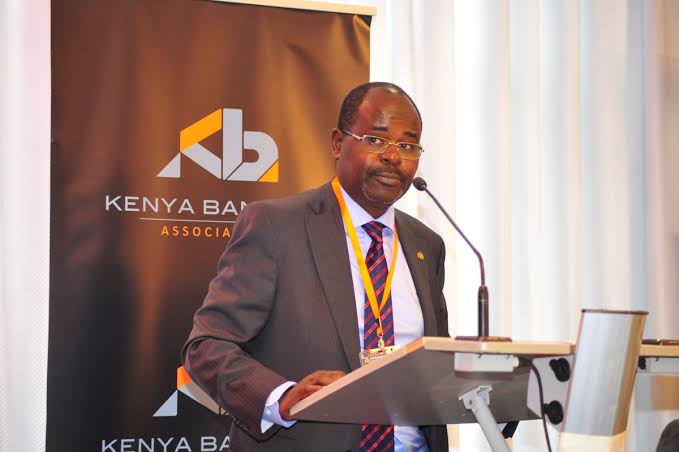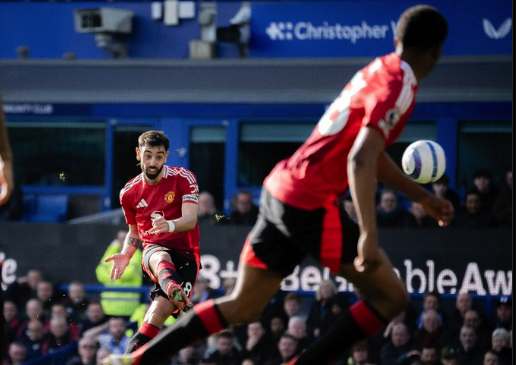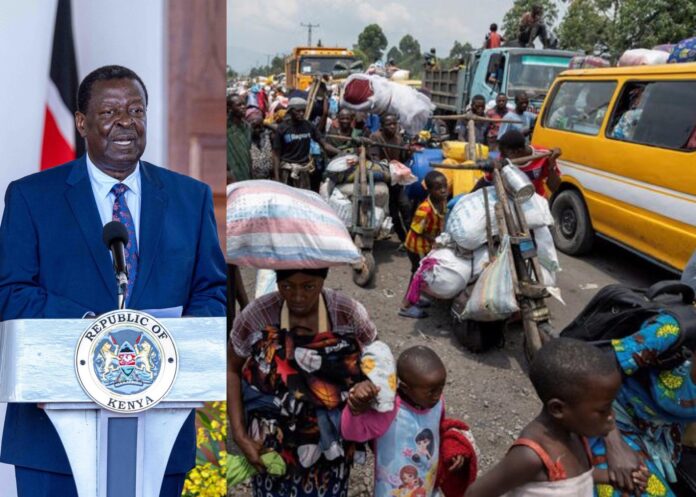The Kenyan government has urged its citizens in the Democratic Republic of Congo (DRC) to exercise extreme caution and consider evacuation as the security situation deteriorates amid an intensifying conflict between Congolese forces and the Rwanda-backed M23 rebel group.
The advisory, issued by Prime Cabinet Secretary and Foreign Affairs Cabinet Secretary Dr. Musalia Mudavadi, comes weeks after a mob vandalized Kenya’s embassy in Kinshasa, highlighting the growing unrest and its ripple effects across the region.
The chaos erupted on January 28, 2025, when a riotous crowd, protesting the violent clashes in eastern DRC, stormed Kenya’s diplomatic mission in the Congolese capital. The attackers damaged embassy property and threatened personnel, prompting Nairobi to issue a stern statement condemning the incident.
“Kenya remains deeply worried about the escalation of conflict in the DRC,” Dr. Mudavadi said in the latest advisory, linking the Kinshasa vandalism to the broader instability fueled by the M23 insurgency.
The conflict, which initially flared in eastern DRC near the Rwandan border, has escalated rapidly since the start of the year. M23 rebels have seized key cities, including Goma, the provincial capital of North Kivu, and are reportedly advancing toward Bukavu in South Kivu.
The United Nations estimates that the offensive has killed at least 900 people, injured over 2,000, and displaced more than 700,000 since January, exacerbating an already dire humanitarian crisis.
Reports of mass rape, slavery, and looting have further alarmed the international community.
“Following the disturbing situation, we are requesting Kenyans in DRC to take extreme caution of their security situation, and where necessary consider possible evacuation, especially from the volatile regions,” the advisory stated.
The Kenyan government has directed its nationals to contact the consulate in Goma or temporary offices in Congo Brazzaville for assistance, signaling contingency plans for a potential mass evacuation.
The embassy vandalism in Kinshasa underscores Kenya’s delicate position as a regional mediator and member of the East African Community (EAC).
President William Ruto, who chairs the EAC, has been vocal in calling for peace, co-hosting a joint EAC-Southern African Development Community (SADC) summit in Dar es Salaam on February 8.
The summit demanded an “immediate and unconditional ceasefire” and directed regional defense chiefs to devise a security plan for Goma. Dr. Mudavadi reiterated this call in the advisory, urging all parties to honor the ceasefire resolution.
However, the ceasefire declared by M23 on February 4 for “humanitarian reasons” has failed to hold, with clashes persisting despite diplomatic efforts.
The rebels’ rapid territorial gains—backed, according to UN experts, by Rwandan troops—have heightened tensions between Kinshasa and Kigali, complicating mediation attempts by Angola, Kenya, and others under the Luanda and Nairobi processes.
The attack on Kenya’s embassy may reflect local frustration with the perceived ineffectiveness of regional interventions. Some Congolese protesters accused EAC nations, including Kenya, of failing to curb Rwanda’s alleged support for M23.
Analysts suggest the vandalism could also stem from Kenya’s earlier deployment of troops to the DRC in 2022 under an EAC peacekeeping mission, which collapsed in 2023 amid mistrust with the Congolese government.
As the conflict spreads beyond eastern DRC, Kenya faces mounting pressure to protect its citizens and diplomatic interests.
The government has not disclosed the number of Kenyans in the DRC, but many are believed to be engaged in business ventures, leveraging the country’s 2022 entry into the EAC to tap its vast market. Now, with violence encroaching on previously stable areas, their safety hangs in the balance.
Dr. Mudavadi emphasized Kenya’s commitment to a peaceful resolution, stating, “We continue to urge the parties in the conflict to consider an immediate ceasefire, as adopted by the Heads of State.”
Yet, with Goma’s airport recently seized by M23 and humanitarian corridors disrupted, the window for safe evacuation may be narrowing—for Kenyans and millions of Congolese alike.
















![【PR release pic】Signing [Secondary Image]](https://uzalendonews.co.ke/wp-content/uploads/2025/02/【PR-release-pic】Signing-Secondary-Image-696x464.jpg)

